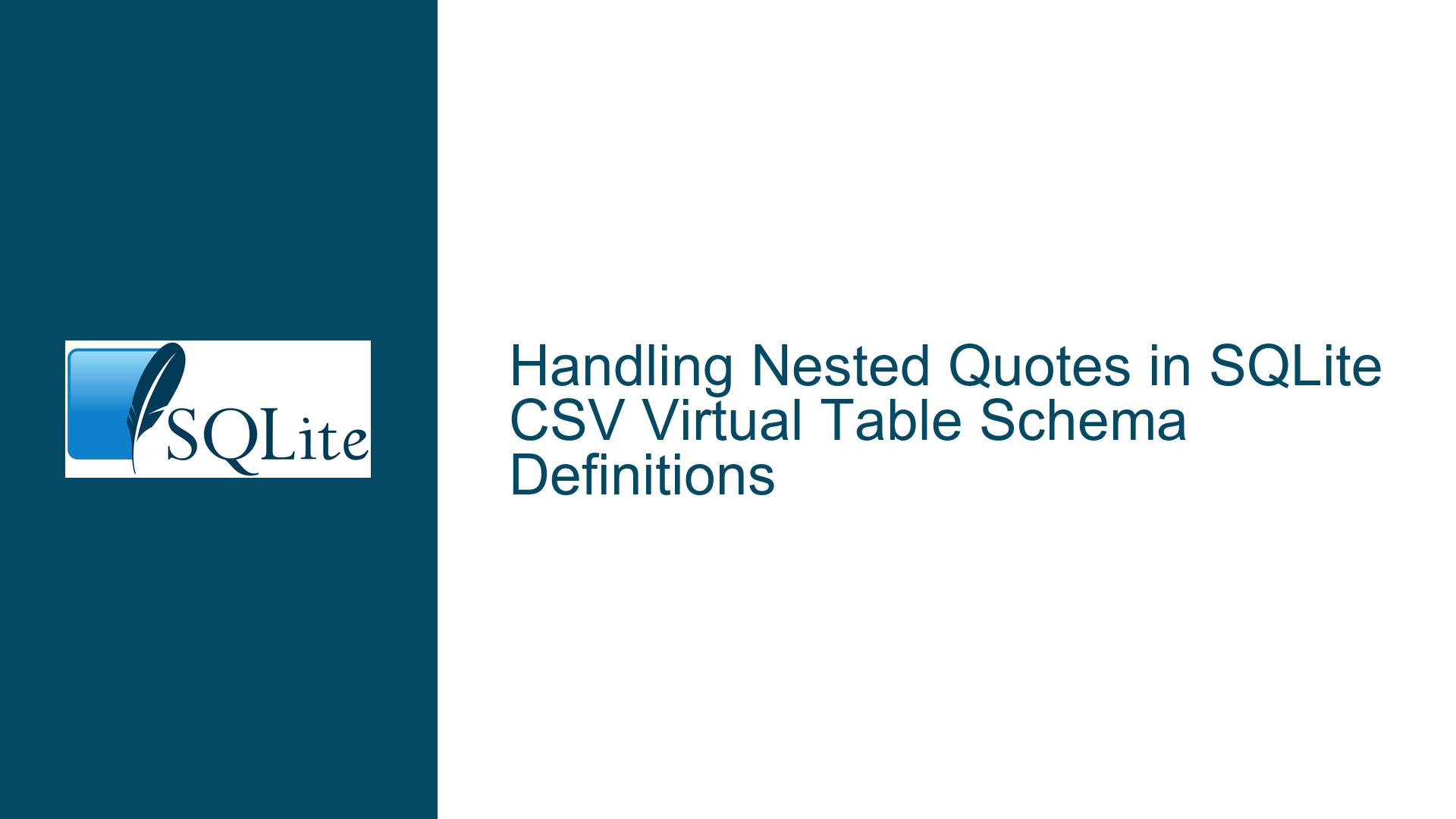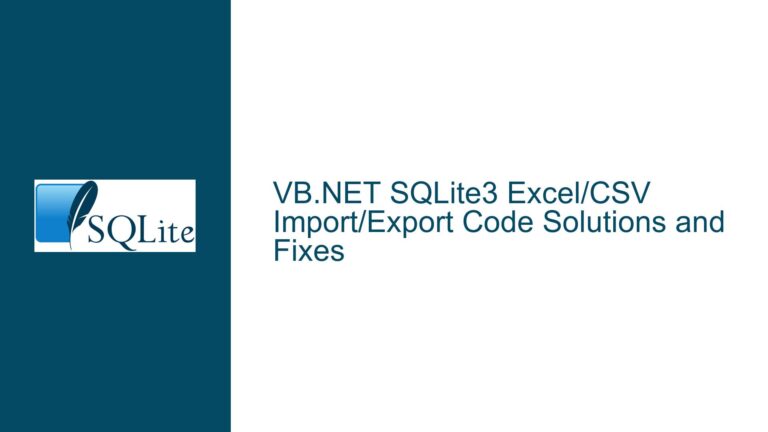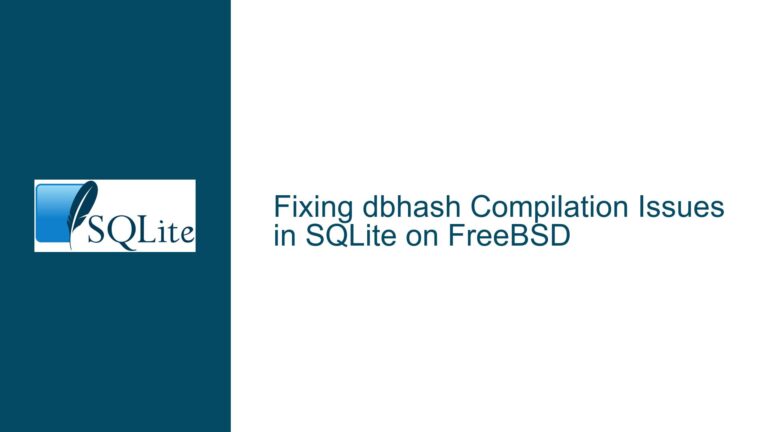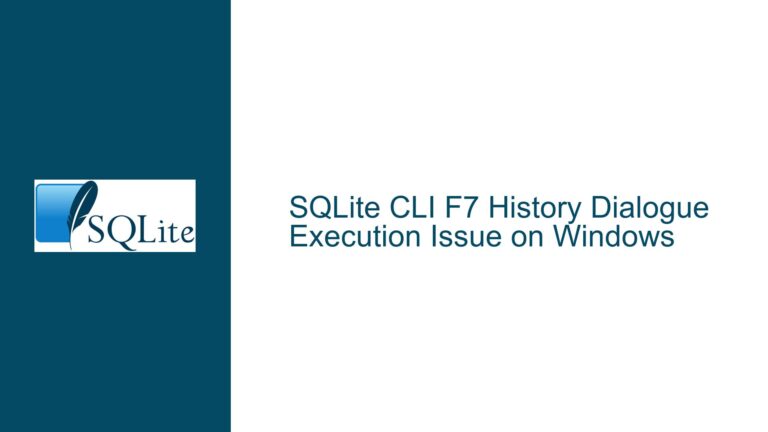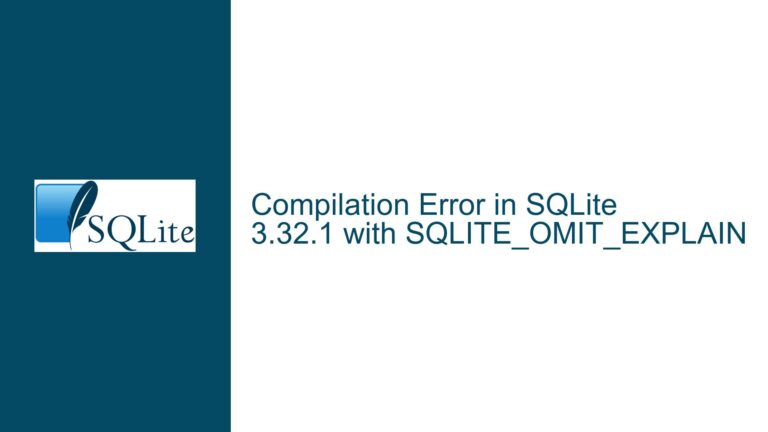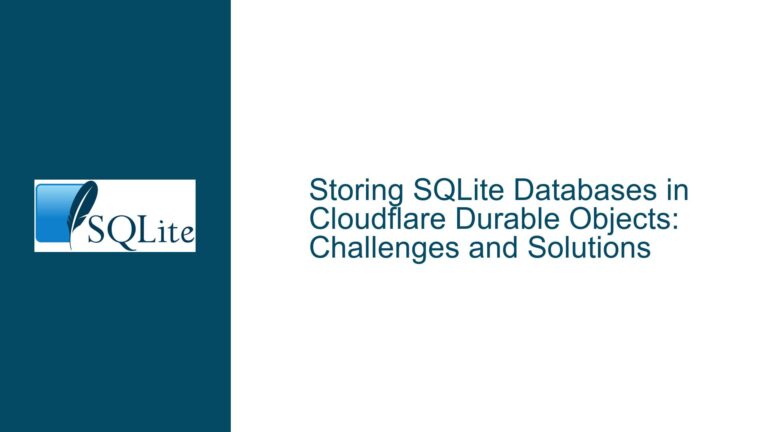Handling Nested Quotes in SQLite CSV Virtual Table Schema Definitions
Issue Overview: Nested Quotes in CSV Virtual Table Schema Causing Column and Default Value Corruption
When defining a virtual table in SQLite using the CSV extension, the schema definition is passed as a string parameter to the csv module. This schema string is subject to unquoting by the csv_unquote function, which processes all quotes within the string, including those that are nested. This behavior becomes problematic when the schema itself contains quoted default values or other string literals, as the unquoting process can inadvertently alter the intended structure of the schema.
In the provided example, the schema for the csv_schema table includes default values for two text columns, some_str1 and some_str2, which are defined as empty strings (DEFAULT ''). However, due to the unquoting process, the inner single quotes are stripped, resulting in a malformed schema. The schema is misinterpreted as having fewer columns than intended, and the default values for the text columns are corrupted. Specifically, the schema is transformed into a state where some_str1 and some_str2 are merged into a single column definition, and the default value for some_str1 is incorrectly set to ,some_str2 TEXT COLLATE BINARY DEFAULT '.
This issue arises because the csv_unquote function does not distinguish between outer quotes (which are part of the parameter syntax) and inner quotes (which are part of the schema definition). As a result, all quotes are treated equally, leading to unintended modifications of the schema string. This behavior is particularly problematic when the schema includes string literals or default values that contain quotes, as these are essential for the correct interpretation of the schema.
Possible Causes: Misinterpretation of Nested Quotes by the CSV Extension
The root cause of this issue lies in the way the CSV extension processes the schema parameter. The csv_unquote function is designed to remove quotes from the input string, but it does so indiscriminately, without considering the context in which the quotes appear. This leads to the following specific problems:
Unintended Unquoting of Inner Quotes: The
csv_unquotefunction processes all quotes in the schema string, including those that are part of the schema definition itself. This results in the removal of quotes that are necessary for the correct interpretation of the schema, such as those surrounding default values or string literals.Schema Corruption: The removal of inner quotes can lead to the corruption of the schema definition. In the example provided, the default value for
some_str1is intended to be an empty string (DEFAULT ''), but the unquoting process removes the inner quotes, resulting in a malformed schema. This corruption can cause the schema to be misinterpreted, leading to errors such as missing columns or incorrect default values.Ambiguity in Quote Handling: The current implementation of the
csv_unquotefunction does not distinguish between outer quotes (which are part of the parameter syntax) and inner quotes (which are part of the schema definition). This ambiguity makes it difficult to predict how the function will process nested quotes, leading to unexpected behavior.Lack of Escaping Mechanism: The CSV extension does not provide a mechanism for escaping quotes within the schema string. This makes it difficult to include quotes in the schema definition without triggering the unquoting process. As a result, developers must resort to workarounds, such as manually re-quoting the inner schema, to achieve the desired behavior.
Troubleshooting Steps, Solutions & Fixes: Properly Handling Nested Quotes in CSV Virtual Table Schemas
To address the issue of nested quotes in CSV virtual table schemas, developers can take several approaches, ranging from workarounds to more robust solutions. The following steps outline the recommended practices for handling nested quotes and ensuring that the schema is correctly interpreted by the CSV extension.
1. Manual Re-Quoting of Inner Schema
One immediate workaround is to manually re-quote the inner schema to compensate for the unquoting performed by the csv_unquote function. This involves adding additional quotes to the schema string to ensure that the inner quotes are preserved after the unquoting process. For example, the schema definition can be modified as follows:
const char * sql =
"CREATE VIRTUAL TABLE csv_tab USING "
"csv(header = True, filename = 'c:/tab.csv', "
"schema = 'CREATE TABLE csv_schema ("
"some_date DATE NOT NULL,"
"some_str1 TEXT COLLATE BINARY DEFAULT '''',"
"some_str2 TEXT COLLATE BINARY DEFAULT '''',"
"some_flt DOUBLE"
"); ');";
In this modified schema, the default values for some_str1 and some_str2 are specified as DEFAULT '''', which results in the correct interpretation of the schema after the unquoting process. This workaround is effective but requires careful attention to the number of quotes used, as over-quoting or under-quoting can lead to further issues.
2. Using Double Quotes for Schema Definition
Another approach is to use double quotes for the schema definition, as double quotes are not subject to the same unquoting behavior as single quotes. This can be achieved by modifying the schema string to use double quotes for string literals and default values:
const char * sql =
"CREATE VIRTUAL TABLE csv_tab USING "
"csv(header = True, filename = 'c:/tab.csv', "
"schema = 'CREATE TABLE csv_schema ("
"some_date DATE NOT NULL,"
"some_str1 TEXT COLLATE BINARY DEFAULT \"\","
"some_str2 TEXT COLLATE BINARY DEFAULT \"\","
"some_flt DOUBLE"
"); ');";
In this modified schema, the default values for some_str1 and some_str2 are specified using double quotes (DEFAULT ""), which are not processed by the csv_unquote function. This approach avoids the issue of nested quotes altogether, as double quotes are treated as part of the schema definition rather than as quotes to be unquoted.
3. Escaping Quotes in the Schema String
A more robust solution is to implement a mechanism for escaping quotes within the schema string. This can be achieved by defining a custom escaping function that processes the schema string before it is passed to the CSV extension. The escaping function would replace single quotes with a special escape sequence (e.g., \') to prevent them from being unquoted by the csv_unquote function. For example:
const char * escape_quotes(const char *input) {
// Replace single quotes with an escape sequence
// This is a simplified example; a full implementation would need to handle
// edge cases and memory management.
char *output = malloc(strlen(input) * 2 + 1);
char *p = output;
while (*input) {
if (*input == '\'') {
*p++ = '\\';
*p++ = '\'';
} else {
*p++ = *input;
}
input++;
}
*p = '\0';
return output;
}
const char * sql =
"CREATE VIRTUAL TABLE csv_tab USING "
"csv(header = True, filename = 'c:/tab.csv', "
"schema = 'CREATE TABLE csv_schema ("
"some_date DATE NOT NULL,"
"some_str1 TEXT COLLATE BINARY DEFAULT '',"
"some_str2 TEXT COLLATE BINARY DEFAULT '',"
"some_flt DOUBLE"
"); ');";
const char *escaped_sql = escape_quotes(sql);
In this example, the escape_quotes function replaces single quotes with the escape sequence \', which prevents them from being unquoted by the csv_unquote function. This approach allows the schema to be defined using standard SQL syntax, without the need for manual re-quoting or the use of double quotes.
4. Modifying the CSV Extension to Handle Nested Quotes
For a more permanent solution, the CSV extension itself could be modified to handle nested quotes more gracefully. This would involve updating the csv_unquote function to distinguish between outer quotes (which should be unquoted) and inner quotes (which should be preserved). The modified function could use a more sophisticated parsing algorithm to identify and preserve quotes that are part of the schema definition, while still unquoting those that are part of the parameter syntax.
For example, the csv_unquote function could be updated to use a state machine that tracks the context in which quotes appear. Quotes that appear within the schema definition (e.g., within a CREATE TABLE statement) would be preserved, while quotes that are part of the parameter syntax (e.g., surrounding the schema string) would be unquoted. This approach would require careful testing to ensure that it does not introduce new issues or regressions.
5. Using Alternative Virtual Table Modules
If the issues with the CSV extension prove to be too difficult to resolve, developers may consider using alternative virtual table modules that do not have the same limitations. For example, the fts5 (Full-Text Search) extension or the json1 (JSON support) extension could be used in place of the CSV extension, depending on the specific requirements of the application. These modules may offer more robust handling of nested quotes and other complex schema definitions, making them a better choice for certain use cases.
6. Best Practices for Schema Definition
Regardless of the approach taken, developers should follow best practices when defining schemas for virtual tables. This includes:
Consistent Use of Quotes: Use single quotes for string literals and default values, and double quotes for identifiers (e.g., table and column names). This helps to avoid confusion and ensures that quotes are used consistently throughout the schema.
Testing and Validation: Always test the schema definition with the actual data to ensure that it is correctly interpreted by the virtual table module. This can help to identify issues with nested quotes or other syntax errors before they cause problems in production.
Documentation and Comments: Include comments in the schema definition to explain the purpose of each column and any special considerations (e.g., the use of nested quotes). This can help other developers understand the schema and avoid introducing errors when making changes.
Version Control: Use version control to track changes to the schema definition, and include detailed commit messages that explain the rationale for each change. This can help to identify when and why issues with nested quotes or other syntax errors were introduced, making it easier to resolve them.
By following these best practices and using the recommended solutions, developers can avoid the pitfalls associated with nested quotes in CSV virtual table schemas and ensure that their schemas are correctly interpreted by the SQLite engine.
